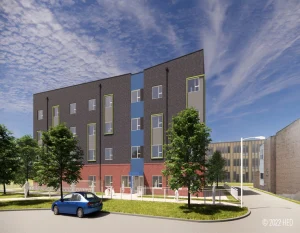The Conservatory Apartments, a 43-unit affordable housing project has officially broken ground in Chicago thanks to Interfaith Housing Development Corp. The project aims to be Chicago’s largest multifamily structure to achieve Passive House Certification.
The site, which is situated next to the famous Garfield Park Conservatory, will provide permanent supportive housing for two groups. 34 of the 43 units will be set aside for people with disabilities who are chronically homeless. For people from the Illinois State Referral Network, nine will be set aside.
IHDC is working with Trilogy Behavioral Health. The organization enables people in mental health recovery to build fulfilling and independent lives. Additionally, they are working with Deborah’s Place a nonprofit organization that supports housing and services for people who have experienced homelessness.
Also Read: Chicago O’Hare Airport expansion receives FAA approval for US$7 billion
HED, a well-known architecture and engineering firm that has previously worked with IHDC on budget-friendly housing projects with ambitious sustainability goals, built Conservatory Apartments. The nearby Henry Bros. Co. will handle construction.
Conservatory Apartments design overview
The interior design is influenced by a biophilic design workshop attended by the design team. Light fixtures and patterned glass were employed throughout the interior to simulate natural forms.
In order to bring outdoor nature inside the building, the team also has a minimal maintenance moss wall in the foyer. It also pays homage to the nearby conservatory with the same name. The strategy will allow the apartment complex to convey a tale about nature that connects it to its location and period.
The PHIUS standard will be important because it will demonstrate that the goals can be met in a challenging four-season climate. Additionally, it will convey the idea that innovative design must promote resident and environmental health in budget housing.
The only other budget Passive House that is certified in Chicago has six units.

Leave a Reply